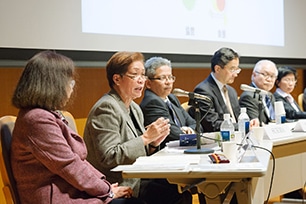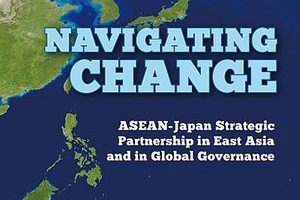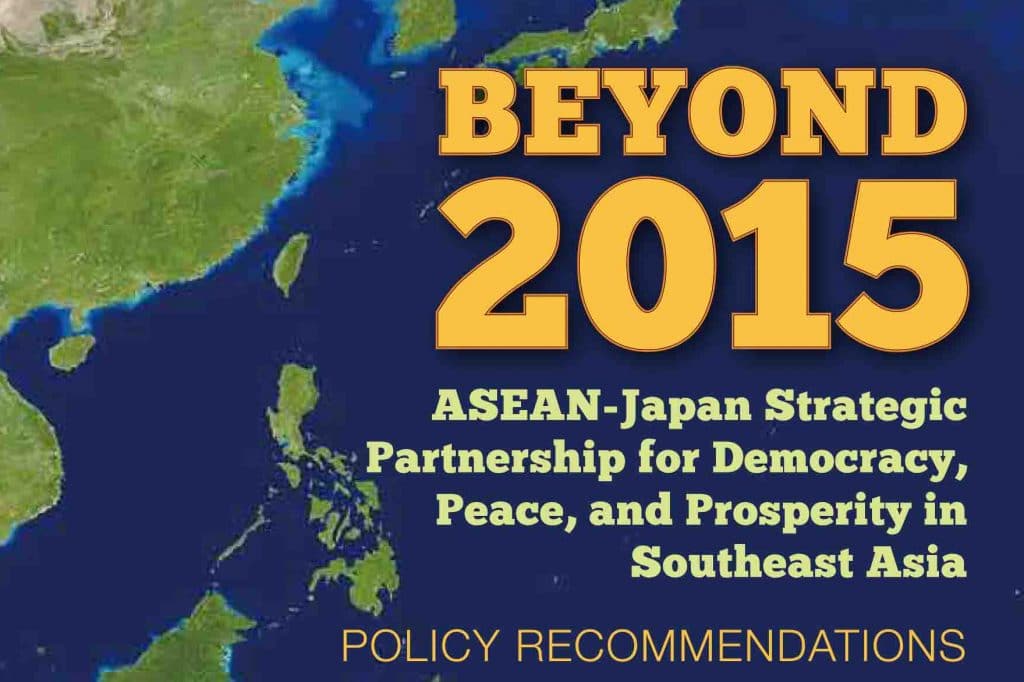ASEAN-JAPAN STRATEGIC PARTNERSHIP & REGIONAL COMMUNITY BUILDING
» Programs
2012–2015
A series of developments in the region, including the emergence of China and India, the establishment of the East Asia Summit in 2005, and the evolution of regional institutions such as Asia Pacific Economic Cooperation (APEC) and the ASEAN Regional Forum (ARF) have made it necessary to redefine the strategic value of Japan-ASEAN cooperation. With the adoption of the 2011 Joint Declaration for Enhancing ASEAN-Japan Strategic Partnership and the ASEAN-Japan Plan of Action (2011–2015), ASEAN and Japan are in the position to build a strategic partnership to benefit not only ASEAN and Japan but also the wider international community in the longer term.
Against this backdrop, the Ministry of Foreign Affairs of Indonesia (Director-General for ASEAN Cooperation), as the proponent of a project on ASEAN-Japan Strategic Partnership funded for two years by the Japan-ASEAN Integration Fund (JAIF), requested the Centre for Strategic and International Studies (CSIS) Jakarta and the Japan Center for International Exchange (JCIE) to compile policy recommendations on the ASEAN-Japan Strategic Partnership beyond 2015. In response, they launched a project to study the role and contributions of ASEAN-Japan Partnership in promoting regional community building in Southeast Asia and East Asia, as well as in contributing to global governance. This project aims to further encourage efforts to achieve greater ASEAN integration with an eye toward 2015, as well as identify a vision for the ASEAN-Japan relationship in 2015–2030.
In its first year, the project explored the framework of Japan-ASEAN partnership in ASEAN and Japan’s role in promoting the integration of ASEAN and Japan. The study was carried out by three study groups consisting of several dozen experts from Japan and ASEAN countries. These were coordinated by Rizal Sukma (Executive Director, CSIS Jakarta) and Yoshihide Soeya (Professor, Keio University). The recommendations were submitted to the ASEAN secretariat and the foreign ministries of Japan and the ASEAN member nations in advance of the October 2013 ASEAN Summit and the ASEAN-Japan Special Summit, and were subsequently published as a book.
In the second year, two study groups focused on the ways in which Japan-ASEAN cooperation can contribute to the creation of an East Asian community, while at the same time helping to address global issues and improve global governance. Those recommendations are being submitted once again to the ASEAN secretariat and the relevant foreign ministries in advance of the 2014 ASEAN Summit and the ASEAN-Japan Special Summit, and the papers will be published as a book in Winter 2014.
Supervisors
| Jusuf Wanandi | Co-Founder and Vice Chairman of the Board of Trustees, CSIS Jakarta |
| Hitoshi Tanaka | Chairman, Institute for International Strategy, Japan Research Institute; Senior Fellow, JCIE, Japan |
Project Coordinators
| Rizal Sukma | Executive Director, CSIS Jakarta |
| Yoshihide Soeya | Professor of Political Science and Director of Institute of East Asian Studies, Keio University, Japan |
Project Managers
| Clara Joewono | Vice Chair, Board of Directors, CSIS Jakarta |
| Hideko Katsumata | Executive Director and COO, JCIE, Japan |
Co-Chairs
| Tham Siew Yean | Professor and Principal Research Fellow, Institute of Malaysia and International Studies (IKMAS), Universiti Kebangsaan Malaysia (UKM) |
| Fukunari Kimura | Professor of Economics, Keio University, Japan; Chief Economist, Economic Research Institute for ASEAN and East Asia (ERIA) |
Members
| Pratiwi Kartika | Researcher, Department of Economics, CSIS Jakarta |
| Vo Tri Thanh | Vice President, Central Institute for Economic Management, Vietnam |
| Chayodom Sabhasri | Faculty of Economics, Chulalongkorn University, Thailand |
| Sanchita Basu Das | Lead Researcher, Economic Affairs, Institute of Southeast Asian Studies (ISEAS), Singapore |
| Yuri Sato | Director-General, Area Studies Center, IDE-JETRO, Japan |
Co-Chairs
| Rizal Sukma | CSIS Jakarta |
| Yoshihide Soeya | Keio University, Japan |
Members
| Herman J. Kraft | Assistant Professor, Department of Political Science, University of the Philippines |
| Tang Siew Mun | Director of Foreign Policy and Security Studies, Institute of Strategic and International Studies (ISIS), Malaysia |
| Nguyen Hung Son | Director, Center for Regional and Foreign Policy Studies, Diplomatic Academy of Vietnam |
| Simon Tay | Chairman, Singapore Institute of International Affairs (SIIA) |
| Takeshi Yuzawa | Associate Professor, Department of Global and Interdisciplinary Studies, Hosei University, Japan |
Co-Chairs
| Carolina Hernandez | Emeritus Professor of Political Science, University of the Philippines, Founding President and Chair of the Board of Directors, Institute for Strategic and Development Studies (ISDS), Philippines |
| Motoko Shuto | Professor, Graduate School of Humanities and Social Sciences, University of Tsukuba, Japan |
Members
| Amara Pongsapich | Professor, Department of Anthropology and Sociology, Chulalongkorn University, Chairperson of the National Human Rights Commission, Thailand |
| Vannarith Chheang | Executive Director, Cambodian Institute for Cooperation and Peace (CICP), Cambodia |
| Thongkhoun Sengphachanh | Institute of Foreign Affairs (IFA), Laos |
| Moe Thuzar | Lead Researcher, Social-Cultural Affairs, ISEAS, Singapore (Myanmar) |
| Risako Ishii | Assistant Professor, Graduate Program on Human Security, Graduate School of Arts and Sciences, University of Tokyo, Japan |
Co-Chairs
| Mely Caballero-Anthony | Head, Centre for Non-Traditional Security Studies, S. Rajaratnam School of International Studies, Nanyan Technological University, Singapore |
| Chikako Kawakatsu Ueki | Professor, Graduate School of Asia-Pacific Studies, Waseda University |
Members
| Kavi Chongkittavorn | Senior Fellow, ISIS, Chulalongkorn University, Thailand |
| Elina Noor | Assistant Director, Foreign Policy and Security Studies, ISIS, Malaysia |
| Nguyen Anh Duong | Deputy Director, Research Department of Macroeconomic Policies, Central Institute for Economic Management, Vietnam |
| Pengiran Dato Paduka Osman Patra | Former Permanent Secretary, Ministry of Foreign Affairs and Trade, Brunei Darussalam |
| Ryo Sahashi | Associate Professor of International Politics, Kanagawa University; Research Fellow, JCIE; Visiting Associate Professor, APARC, Stanford University |
| Meidyatama Suryodiningrat | Chief Editor, Jakarta Post, Indonesia |
| Tan See Seng | Head, Centre for Multilateralism Studies, S. Rajaratnam School of International Studies, Nanyang Technological University, Singapore |
| Takashi Terada | Professor, Graduate School of Political Science, Doshisha University, Japan |
Co-Chairs
| Djisman Simandjuntak | Professor and Chairman of the Board of Executives, Prastiya Mulya Foundation, Indonesia |
| Toshiya Hoshino | Professor, Osaka School of International Public Policy, Osaka University |
Members
| Rafaelita M. Aldaba | Senior Research Fellow, Philippine Institute for Development Studies |
| Yose Rizal Damuri | Head, Department of Economics, CSIS Jakarta |
| Jun Honna | Professor, Department of International Relations, Ritsumeikan University, Japan |
| U Kyee Myint | Myanmar Institute of Strategic and International Studies |
| Mie Oba | Associate Professor, Tokyo University of Science |
| Simon Tay | Chairman, Singapore Institute of International Affairs (SIIA) |
| Tran Viet Thai | Director, Center for Regional and Foreign Policy Studies, Institute for Foreign Policy and Strategic Studies, Diplomatic Academy of Vietnam |
| Steve CM Wong | Senior Director of Economics, ISIS, Malaysia |
PROJECT ACTIVITIES
- Tokyo Phase 2 Final Co-chairs’ Meeting and Policy Roundtable (Tokyo, June 12–13, 2014)
- Jakarta Phase 2 Workshop (February 18–19, 2014)
- Public Seminar: 40th Year of ASEAN-Japan Friendship and Cooperation Commemorative Symposium (Tokyo, November 11, 2013)
- Briefing for 11 Diet members with the study group (Tokyo, November 11, 2013)
- Luncheon roundtable with 40 experts from the policy community (Tokyo, November 11, 2013)
- Bali Phase 2 Preparatory Meeting (June 12–14, 2013)
- Public Seminar: ASEAN-Japan Strategic Partnership in Southeast Asia and Regional Community Building (Jakarta, June 11, 2013)
- Jakarta Phase 1 Final Workshop: ASEAN-Japan Strategic Partnership In Southeast Asia (June 10–11, 2013)
- Tokyo Phase 1 Workshop (February 2–4, 2013)
- Bali Phase 1 Preparatory Meeting (September 1–2, 2012)





